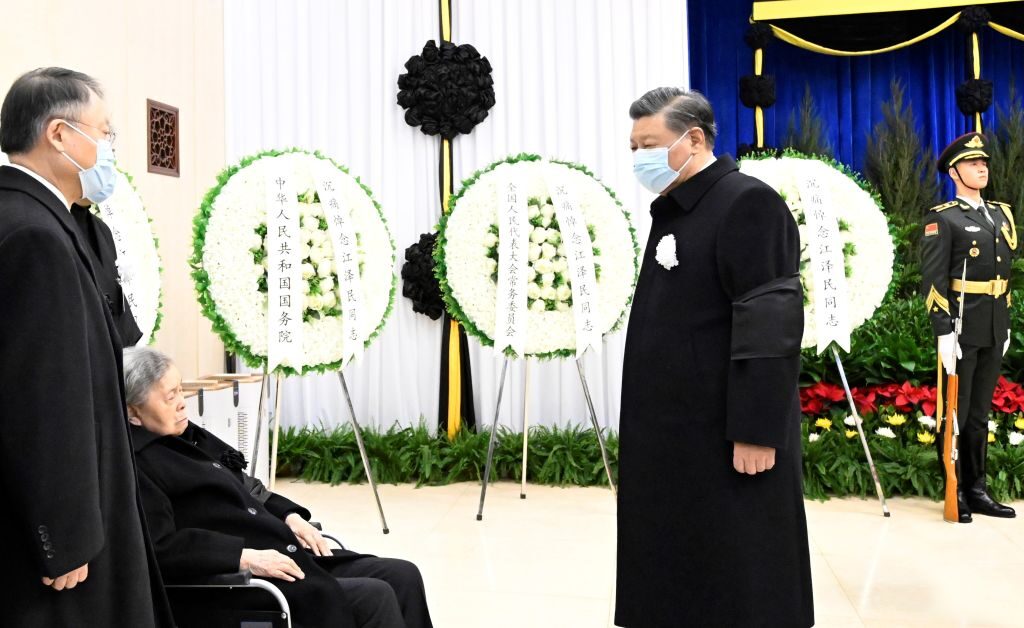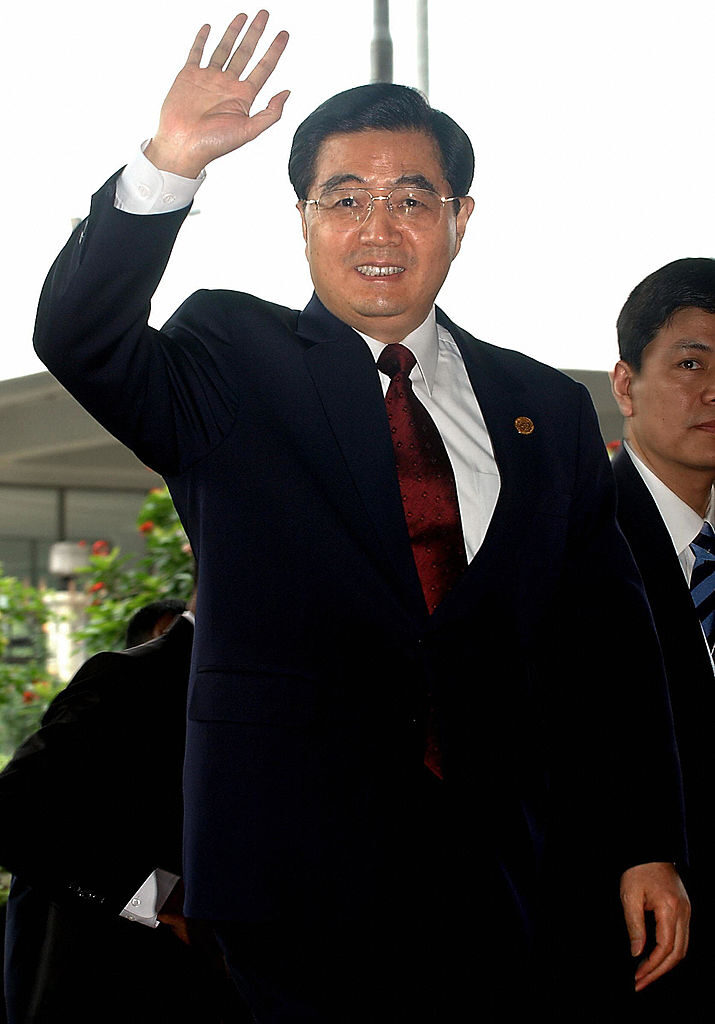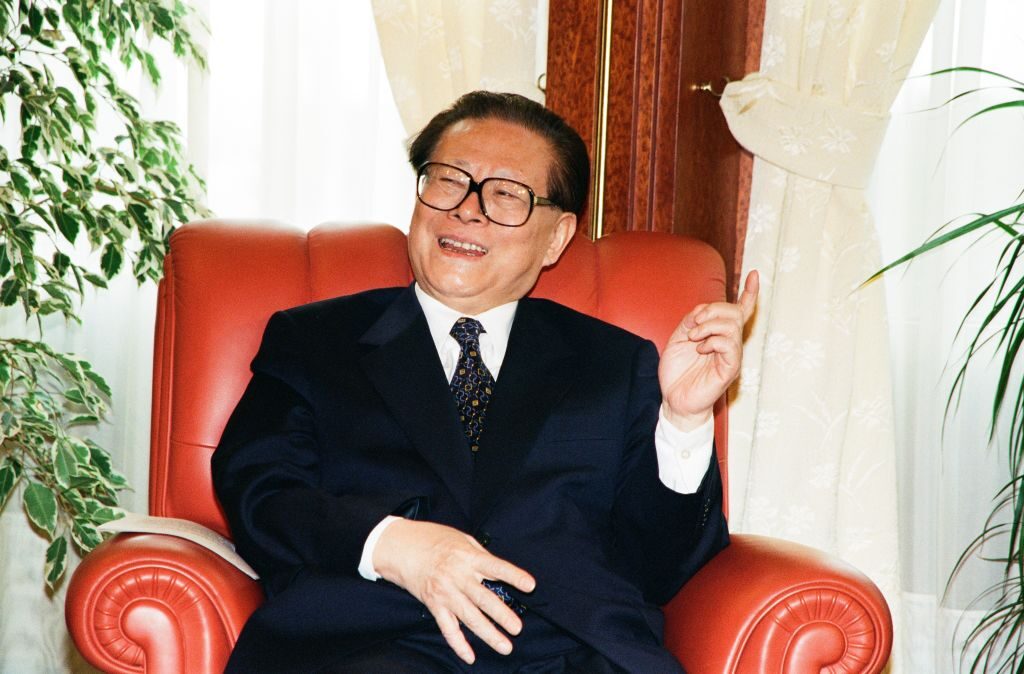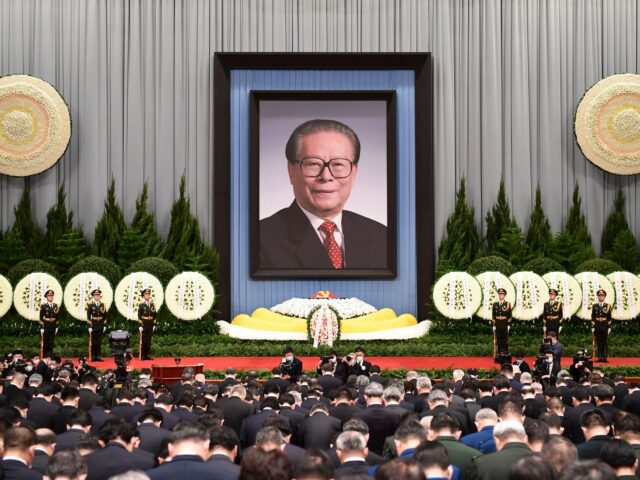Chinese former President Hu Jintao, who presided over the country and Communist Party before current dictator Xi Jinping, did not attend the official state funeral for his predecessor Jiang Zemin on Tuesday.
Hu had not been seen in public between mid-October, when the 79-year-old was manhandled and dragged out of the prestigious Communist Party Congress while sitting less than a foot away from Xi, until Monday, when he attended a smaller service for Jiang at a military hospital.
Chinese state broadcaster CCTV made a note of highlighting Hu’s presence at the event on Monday. The South China Morning Post claimed that Hu did not attend the larger state funeral because of his advanced age.
Hu’s absence nonetheless aroused suspicion given his unceremonious ouster at the Party Congress. The Communist Party holds its Congress every five years to choose its president, Party chairman, and the members of the Politburo, its top governing body. Under Xi, the Congress has become essentially a coronation ceremony, as Xi has no competition for the top spot and has used his position to fill the Politburo with loyal lackeys.

Xi Jinping expresses deep condolences to Comrade Jiang Zemin’s wife Wang Yeping and other relatives in Beijing, capital of China, Dec. 5, 2022. The remains of Jiang Zemin, who passed away last Wednesday, were cremated at the Babaoshan Revolutionary Cemetery in western Beijing on Monday. (Li Xueren/Xinhua via Getty)
Hu disappeared from the public eye in October, when cameras caught him being dragged out of the Congress on camera shortly before Xi was “elected” to another term in leadership. Hu appeared to be shuffling papers when two younger men appeared and grabbed him by the elbows, dragging him out. Hu appeared to turn to Xi, who was seated next to him, and quietly plead, but Xi mostly ignored him. To Hu’s other side, one Communist Party official appeared to move to help the elderly man, but his colleague pulled him back, urging him not to get involved.
Hu had not been seen in public since that occasion. The Chinese government only minimally addressed questions about the bizarre spectacle. The Xinhua News Agency, a state media organ, claimed that Hu “was not feeling well” and that he had “insisted” on being at the event despite his poor health. Ominously, Xinhua added that, following his ouster, “now he is much better.”
Hu resurfaced on Monday at an event at a Beijing military hospital featuring only top Communist Party officials, which appeared to occur before Jiang’s body was cremated. A group of male Party officials wearing sanitary masks bowed before a shrine in Jiang’s honor and made a line to honor him and offer a departing greeting. Hu appeared to need someone to help him stand and walk to the shrine.
“Hu Jintao also went to the hospital to pay his final respects to Jiang,” the state-run CCTV emphasized.
Hu did not resurface for the official funeral on Tuesday. According to the South China Morning Post, an anonymous “official source” claimed that Hu’s health was the dominant reason. The state funeral required top Party officials to stand for the entire ceremony, which lasted about an hour, and the source claimed that Hu and several other absent communist elders “could not stand up for that long, given their age.”
Several officials and VIPs at the ceremony did not stand, however, most prominently Jiang’s wife Wang Yeping, who is 94 years old. The Morning Post also identified at least three Party seniors in addition to Hu who did not attend the state funeral but did attend the smaller ceremony on Monday, 94-year-old and 105-year-old former officials.
Jiang served as president from 1993 to 2003, immediately before Hu, and made a name for himself in his 90s by being overtly disrespectful to Xi during the 2017 Communist Party Congress. During Xi’s three-hour speech to the Congress that year, Jiang yawned, checked his watch, read to himself, and otherwise undermined the prestige of the occasion, turning him into a viral internet sensation that younger Chinese fans referred to as “the toad.” At the time, Jiang was 91, and Xi’s regime did not drag Jiang out of the Congress by his elbows or appear to punish him in any way.
The regime also did not censor comments on Weibo, the state-controlled social media outlet in China, celebrating or laughing at Jiang.

File/ Chinese President Hu Jintao arrives at Jakarta Convention Center to attend the Asia Africa Summit 2005, in Jakarta 22 April 2005. (CHOO YOUN-KONG/AFP via Getty)
Jiang and Hu had a tumultuous relationship. Hu is remembered as being a low-profile Chinese president, who did little to wield his power and is often accused of allowing corruption to run rampant in the Party. Many attribute his lack of power to Jiang, who continued to pull strings behind the scenes to retain power and contain Hu’s ability to run the country. Jiang did not appear to similarly handicap Xi Jinping, who took power in 2013.
Speaking during the public funeral on Tuesday, Xi expressed gratitude to Jiang for his signature achievement as president: violently crushing China’s pro-democracy movement and eliminating any dissent following the 1989 Tiananmen Square massacre. While Jiang was mayor of Shanghai when the massacre happened, his primary task upon becoming president in 1993 was to rehabilitate China’s public image and ensure that any remnants of dissident movements in the country were destroyed.
Jiang never expressed any remorse for the mass murder that occurred in Beijing that year, emphatically stating, “We do not believe that there was any tragedy in Tiananmen Square. What actually happened was a counterrevolutionary rebellion aimed at opposing the leadership of the Communist Party and overthrowing the socialist system.”

A file photo dated April 4, 2000 shows Jiang Zemin poses for a photo during his visit in Ankara, Turkiye. Former Chinese president Jiang Zemin has died at 96 age due to leukemia and associated multiple organ failure in Shanghai. (Zekeriya Albayrak/Anadolu Agency via Getty)
“In the late 1980s and early 1990s, serious political storms occurred at home and abroad, and world socialism experienced severe complications. Some western countries imposed so-called ‘sanctions’ on China,” Xi recalled in his address on Tuesday.
“In 1989, when a serious political turmoil occurred in China, Comrade Jiang resolutely supported and implemented the Party Central Committee’s decision to take a clear stand against turmoil,” the dictator continued. “The decision to safeguard the fundamental interests of the people relies on the vast number of party members, cadres and the masses to effectively safeguard Shanghai’s stability.”
Jiang reportedly died of leukemia last week at the age of 96.

COMMENTS
Please let us know if you're having issues with commenting.